Uncertain future for Bloomington farmers market, still no decision on charges against protestors
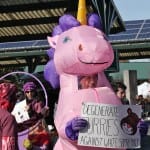
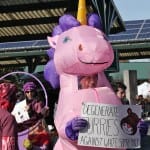
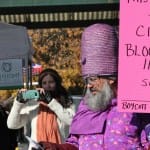
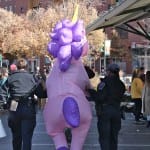

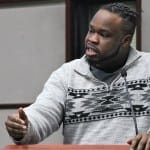
At Monday’s meeting of the farmers market advisory council, held in Bloomington’s city council chambers, few answers about the future of the market could be gleaned from the group’s discussion. That’s partly because the group’s role is just advisory, to the city’s four-member board of park commissioners.
Department administrator for the parks and recreation department, Paula McDevitt, told the advisory council “[W]e do not have an announcement tonight about the future of the market…”
What makes the future uncertain has been a season of protests against a vendor with alignment to white-supremacist groups. The market was suspended for two weeks in late July amid concerns about possible violence.
At Monday’s meeting, the market’s coordinator, Marcia Veldman, said attendance was off by about half compared to previous years. The last couple of years, the market has seen around a quarter million visitors in the course of a season, according to the city of Bloomington’s data portal.
For several vendors, the timeframe for making a decision about whether sell at the market next year is short. Rebecca Vadas is a honey vendor who also sits on the farmers market advisory council. She said at Monday’s meeting that she had to make a decision by mid-December. One of the decisions she has to make is how many bees to buy. “We’re all at a crossroads,” she said.
Bruce McCallister, who chaired Monday’s meeting, said after meeting with vendors and listening to them, “My takeaway was there are a lot of people really hurting [financially and personally] from this season and a sense of urgency to try and address that before next year.”
Decreased sales
Some of the uncertainty stems from the tension between protestors and other vendors who are not targets of the protests, and who sympathize with the protestors in principle, but who have seen their sales drop due to flagging attendance numbers.
Informal information shared by some vendors at Monday’s meeting suggest sales have been down by around 30 percent.
Vendors want to know what they can expect next year so they can plan accordingly. The city takes the position that Schooner Creek Farms, the vendor targeted by protests, can’t be expelled from the market because of First Amendment protections. If Schooner Creek Farms sells at the market, protestors are almost certain to continue regular demonstrations next year.
The most recent protest, on Nov. 9, was calculated to result in arrests—demonstrators carried signs in an area where the market’s rules say signs can’t be held. Wearing T-shirts with the similar messages to the signs appears to be within the rules. One of the protestors, Thomas Westward, told The Beacon he hoped the court would dismiss the charges, “because the rule that they made is a blatant violation of the First Amendment—it’s clearly content-based, directed at us.”
Whether charges will even be filed was still not known by Monday night, 10 days after five people given summonses for criminal trespass and disorderly conduct. Deputy prosecutor for Monroe County, Jeff Kehr, told The Beacon late Friday that no charging decisions had been made—his office was waiting until they had all the information needed to make those decisions. As of the end of the day Monday, there was no further word.
Just following his arrest, The Beacon asked Westgard why his group, which calls itself the “Purple Shirt Brigade” is willing to accept as a consequence of their market protests the negative economic impact on other vendors. He responded by saying that if the city had enforced its own rules—on providing accurate names for stall assistants, among other things—then Schooner Creek would have already been banned from the market.
Westward said, “I wish more vendors were with us.” He drew an analogy of Schooner Creek to a weed, saying, “Not so many of [the farmers at the market] have stepped up to pluck this particular weed. I wish they would.”
Asked by The Beacon on the day of the arrests, if the morning had unfolded the way she expected, Sarah Dye of Schooner Creek Farms said, “I expected to come to market and sell my wares as I have for nine years, and that’s what I did.”
Privatization as an option
Transitioning the market to a private 501(c)(3) has been suggested as a way to exclude Schooner Creek. The idea of privatizing the market was one of the topics debated by candidates for the city council during the recent municipal election campaign.
In District 2, Republican Andrew Guenther used his support of market privatization to differentiate himself from Democrat Sue Sgambelluri, in a contest won by Sgambelluri.
In District 3, independent Nick Kappas, who narrowly lost to Democrat Ron Smith, also said he supported privatizing the farmers market. “I don’t take my daughter there anymore,” Kappas said. He goes to the market at 8 o’clock, gets his stuff and gets out of there, he said, adding, “The market as we’ve known it, it’s gone.” Kappas concluded: “I believe privatization under 501(c)(3), just like the winter market, is the way for us to go.” (The winter market is one of the projects of the nonprofit, Center for Sustainable Living.)
The winter market will operate out of the pavilion in the city’s newly constructed Switchyard Park, starting Dec. 7.
Mission Statement
For the farmers market advisory council on Monday, some of its agenda items assumed the city would be hosting a farmers market in some form next year. Members deliberated on changes to the market’s mission statement, and on possible changes to the fee structure for farmers, compared to food artisans (aka prepared food vendors).
The conversation on the mission statement included a suggestion at the advisory council table that language be added to say that the market is supposed to promote cultural diversity. That prompted several from the audience of a couple dozen people to take the public podium, starting with Vauhxx Booker, to point out the fact that the advisory council itself consists only of white people.
Booker said, “Putting the statement there doesn’t make it happen—diversity and inclusion are things that are borne out of practice time and time again, until we perfect them. I would ask this body to look at the membership makeup of the body that is creating this mission statement about inclusion.”
Advisory council member Kathy Aiken asked how the advisory council could get the word out to people of color that there are openings on the group. The two specific suggestions that came from the audience were to reach out directly to Black Lives Matter or the Commission on Hispanic and Latino Affairs. Feldman said the city had not done that in the past, adding “We certainly will in the future.”
Others rose to speak to suggest adding language about safety and the expulsion of hate groups. The reference to hate groups drew to the podium a Bloomington resident, who gave Margaret as her first name to The Beacon after she spoke. Margaret started by saying that finding ways to lower prices would help make the market more accessible and inclusive. If you look at who attends the market, she said, it’s upper-middle-class folks, households with two incomes, and people who have paid off the mortgages on their houses long ago.
Margaret then said that if hate groups were to be excluded, she didn’t want Planned Parenthood to be at the market, or Black Lives Matter, which she said had a history of violence against police. The market should be inclusive of all people, including Christians like her, she said.
A bit later, Anna Lynch rose to rebut the implication that Christians were not welcome at the market. Lynch called the previous comment “hyperbole” and said the idea that Christians were not welcome was “off topic.” Bloomington has a large Christian population that shows up at the market, Lynch said.
Fee Structure
The question of fee structure turns out to play somewhat of a role in how vendors are weighing whether to return to the market next year. On Monday night, the advisory council was considering a proposal from the food artisans to change their fee structure to a flat fee, the same approach that is taken to farmer fees.
Food artisans currently pay 10 percent of their gross revenue as a market fee.
Measured by revenue, the 17 food artisans at the market stack up slightly better than the 121 farm vendors. The 2018 budget numbers shared at Monday’s meeting showed $51,009 contributed by farm vendor fees compared to $57,708 contributed by food artisans.
That was one factor considered by the advisory council in voting unanimously to recommend increasing their number from 9 to 11, to add two people to represent the food artisans. Farmers and market-goers already have four representatives apiece on the advisory council.
At Monday’s meeting, Eric Schedler from Muddy Fork Farm & Bakery, advocated for the fee structure change. Members of the advisory council felt like he’d made a strong case—helped by comparisons to other markets across the country—but were not willing to vote on a recommendation that night.
The idea of paying a percentage of gross sales as part of the fee was something that drew a smattering of interest among farm vendors, because that approach would force the city to have some “skin in the game” for promotion and advertising of the market through the whole market season.
With a flat fee approach, when it’s paid at the start of the year, the city has no incentive to get people to go to the market, vendors said. Another alternative suggested by vendors was to pay incrementally through the season, instead of having to commit to the whole season at the start of the year. The 2018 budget shows $1,275 for advertising, and some of the vendors at the meeting wanted to see that amount increase.
Next Steps
Paula McDevitt said the information discussed by the advisory council on Monday would be shared with the city administration. Everything is being looked at, she said. Staff will make a recommendation to the board of park commissioners for final decision, McDevitt said.
The next scheduled meeting of the board of park commissioners is Tuesday Nov. 19, but the farmers market does not appear on its agenda. Based on the time frames mentioned at Monday’s advisory council meeting, a decision by the board of park commissioners about the future of Bloomington’s farmers market might come at its Dec. 10 meeting.




Comments ()